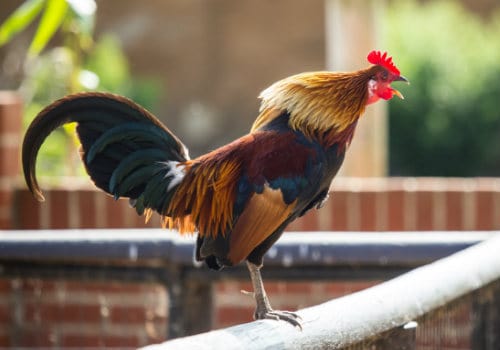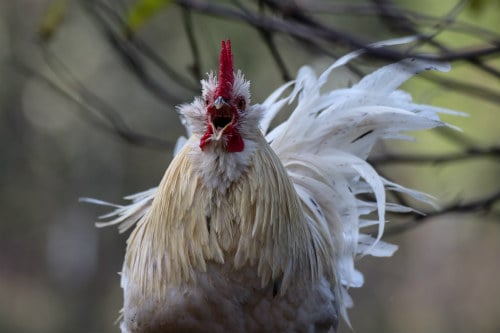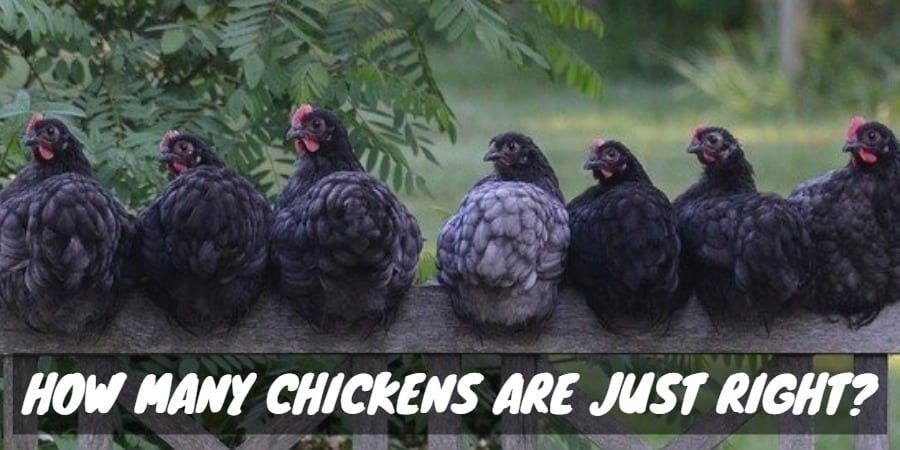Chicken noises can generally be grouped into four categories—alarm noises, conversational noises, reassuring noises, and proclamation or assertive noises. Alarm noises include noises to signal for the presence of predators and or other threats, conversational noises include chatter between members of the same brood, reassuring noises are generally exchanged between mother hens and chicks, and proclamation noises can be a rooster’s crow or a brooding hen’s boasting.
Alarm Noises
Alarm noises on chickens can range from warning calls to other birds to just general squawks of alarm. Because chickens are very social creatures, each bird serves as both early warning and alarm systems for all of the other birds. Alarm noises are usually loud and harsh in sound, and can either call for other chickens to respond or urge them to flee.

You may hear alarm noises from your chickens when they’re surprised or startled by a new presence in their coop. Or even if you pick one of them up without sufficient warning. These noises are often harsh and loud, to draw attention and catch the ear of the other chickens. However, if you hear warning noises from your chickens and can’t identify an immediate threat, it may be wise to check on your flock and make sure there’s nothing that’s putting them in danger.
Examples of alarm noises include: shrill cackles, the classic “bwok-awk”, or short, sharp crows from roosters and some hens.
[amazon bestseller=”chicken feed”]
Conversational Noises
Conversational noises make up the bulk of sounds that you can expect to hear from your chickens—a casual exchange of clucking that signal the chickens’ exchanges throughout the day. Generally, this can include usual chatter between birds, or an ongoing flow of sound that signals the chicken’s contentment or relaxation around the coop.
Scientists agree that chickens use up to 24 separate vocalizations as a method of communication, and most of these vocabulary phrases are used in day to day communication around the coop or the yard. As mentioned above, chickens are very social, and they like to check in with the other members of their flock throughout the day. This call-and-response method of communication fills up most of their conversation through the day, letting each chicken know that the others are alright.
If you are greeted with a flood of noise every morning when you open up your coop, know that you’re doing something right! Chickens will often chatter at their human friends as a way of including them in the flock conversation, or as a simple good morning greeting! Your chickens should feel comfortable chattering and making conversation around you and other humans, so long as they feel that the human in question doesn’t pose any threat.
Examples of conversational noises include: chattering, clucking or cooing. Pay close attention to the noises your chickens make while roosting or settling into a comfortable new roost, as the murmurs and coos they make can signal their contentment in a new place.
Reassuring Noises

Members of the same flock often exchange reassuring noises throughout the day, but, unlike conversational noises, reassuring noises are most commonly exchanged between mother hens and their chicks. Conversations between hens and chicks are often ways of assuring the baby chickens that their mothers are right behind them, or that a new area of the yard or coop is safe enough to be explored.
Another type of reassuring noise—the reassuring noise that signals a new food discovery—can be exchanged between flock members. Often, a rooster or the hen that serves as the flock leader will give a series of encouraging, reassuring clucks to the rest of the flock when they’ve encountered a new food source. Keep an ear out for a “tuk tuk tuk” noise from hens to chicks or from roosters to the rest of the flock. For these hens, this may be followed by the mother hen picking up and dropping the food a few times, ensuring that her chicks get the idea.
Examples of reassuring noises include: “purring” murmurs from mother hens to the chicks, soft clucking between members of the same flock, or the aforementioned “tuk tuk tuk” noise that signals a new food source is safe for consumption.
Proclamation or Assertive Noises

Proclamation noises can generally be sorted into two categories: proclamations from hens and proclamations from roosters. While the latter are usually aggressive or territorial noises, the former are usually related to the egg-laying process and can signal a hen’s pride or accomplishment upon laying an egg. However, hens can be just as territorial as their male counterparts, and a small category of assertive noises is reserved for hens that are feeling particularly defensive of what they consider to be their space.
[amazon bestseller=”chicken worms”]
Proclamation noises from roosters are most widely recognized as the iconic rooster’s crow. While you may be used to hearing your roosters crowing at sunrise, they can and will crow at all hours of the day, either as an attempt to assert their dominance over the rest of the flock or just as a way of greeting the entire coop at any time. You may also hear some boasting crows from roosters if they perceive another rooster to be a threat to their status, so keep an ear out for loud crows from your flock as an indication of potential unrest.
Proclamations from hens, on the other hand, are usually heard when hens are roosting. You may hear what’s commonly known as “the egg song” from a proud hen who has just finished laying an egg, and other hens in the area may join in her celebration. However, hens who are feeling territorial about their nests and roosts may growl or even shout other hens out of the way and may do the same to humans.
Examples of proclamation noises include: crowing, purring, growling, or “egg singing”.





Hi Charles, Thanks for your excellent synopsis of chicken noises. I too have been keeping / raising chickens for a few years near Winnipeg, Manitoba.
The reason I searched for “chicken noises” was for some additional information. Most days I sing a song with guitar in my coop of 28 laying Bovan Browns. This is for my grandchildren and whoever else wants to hear them. We’re just having fun but I thought I would begin adding “fun facts” like additional info on sounds, egg shapes and whatever. Thanks again. Grandpa Russ (YouTube: Loewen Homestead.)